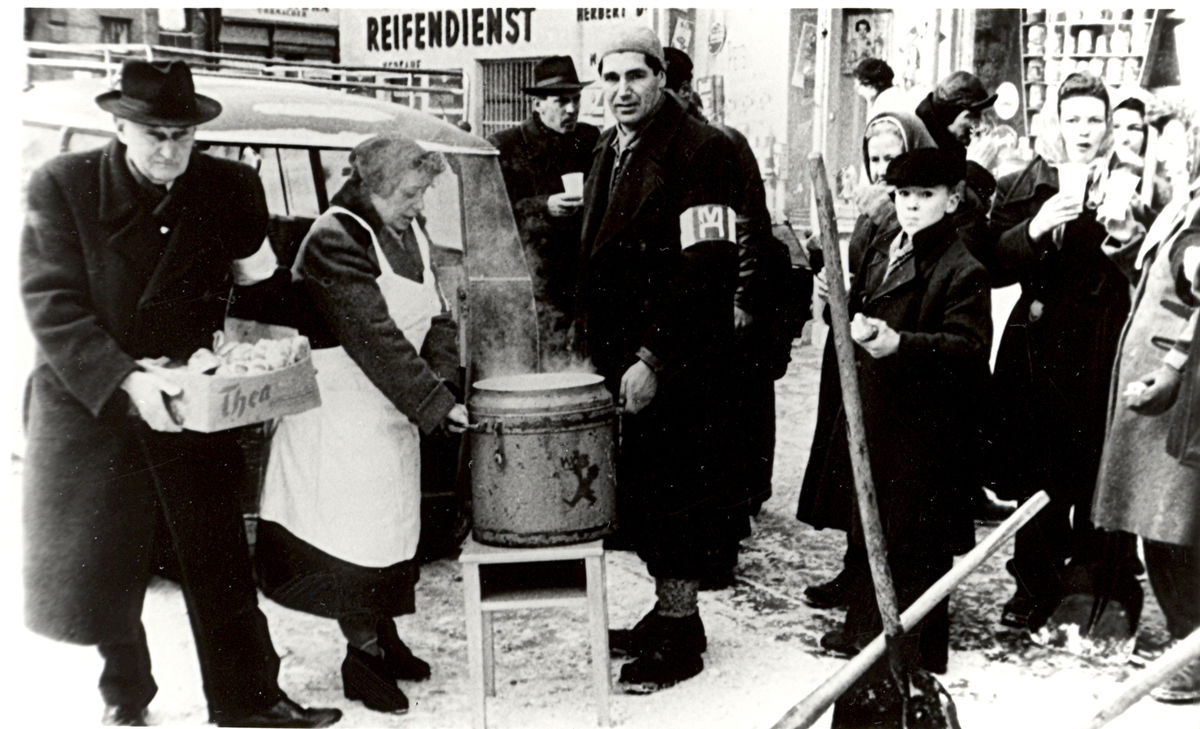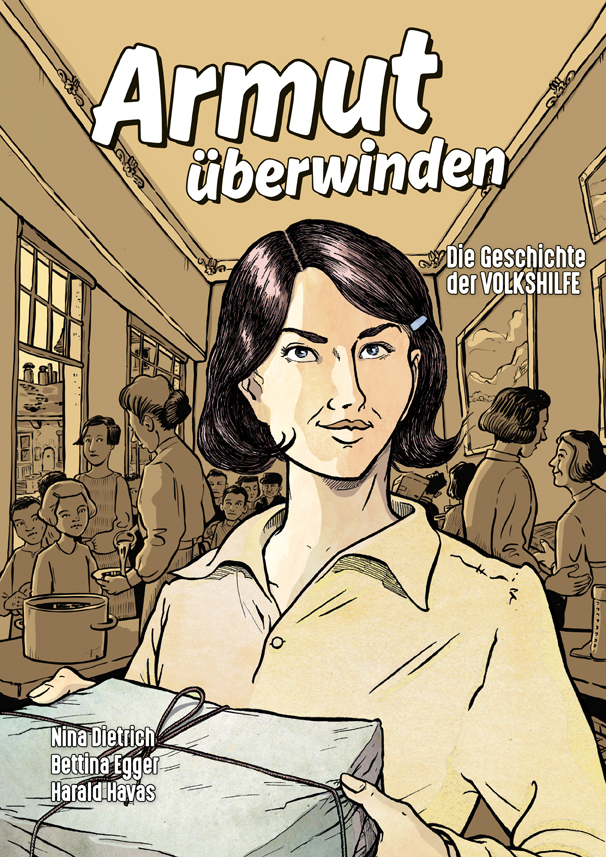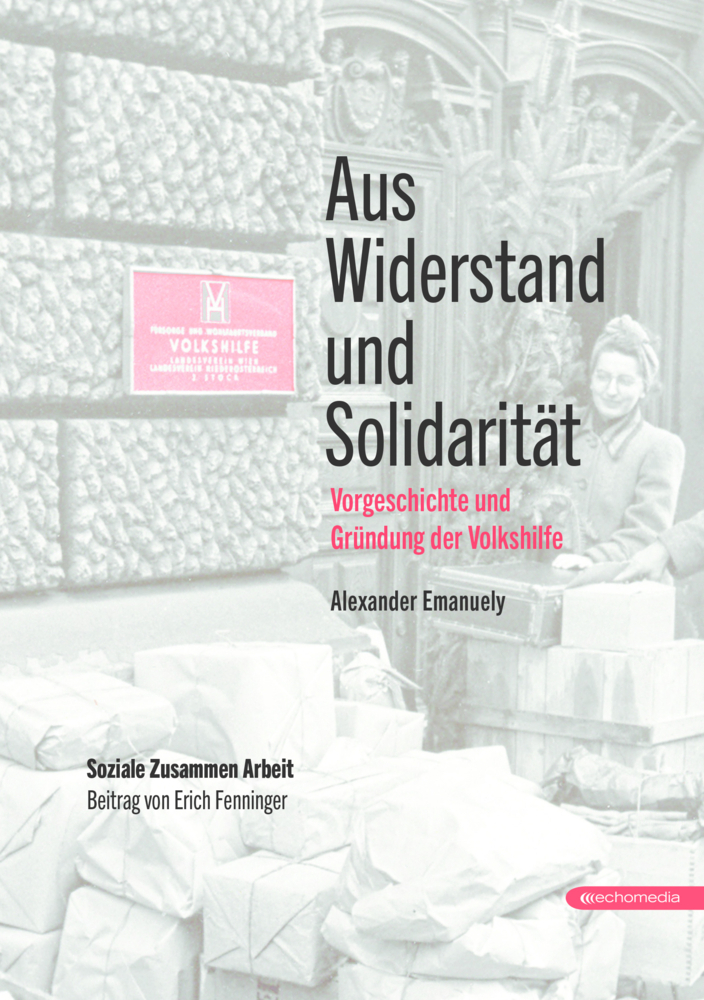
1947-1950
- Volkshilfe is founded. It exists in all federal states.
- In Upper Austria Volkshilfe helps people in need.
- District groups are opened in Bad Ischl, Linz, Grieskirchen, Linz, Urfahr, Rohrbach, Steyr and Wels.
- Volkshilfe is running a lottery. Raffle tickets are sold. You can win something.
Volkshilfe gives the money for the raffle tickets to people in Austria and abroad who are in need.
1951-1960
- There is a major flood. Volkshilfe helps people who are in need due to the floods.
- There is a popular uprising in Hungary. This means that people are arguing with the government.
Many people flee to Austria. Volkshilfe provides these people with clothing and food. - Volkshilfe opens a kindergarten in Linz
1961-1970
- More and more older people need help. Volkshilfe organizes parties for older people. They also goes on excursions.
Volkshilfe employs young people to look after the elderly.
1971-1980
- Volkshilfe organizes recreational vacations for older people and children.
- Volkshilfe opens an after-school care center in Linz. This is a place where children can go after school.
- Even more older people are being cared for.
- Older people with little money receive shopping vouchers from Volkshilfe.
- Volkshilfe helps children in other countries such as Afghanistan, Nicaragua, Somalia and the Western Sahara.
The project is called “Austria Package”. - Volkshilfe continues to run the lottery and collect donations.
1981-1990
- Volkshilfe is starting to look after elderly people at home. That means mobile care for the elderly.
- Volkshilfe is starting to help people who have fled and come to Austria.
This part is called Flüchtlings- und MigrantInnenbetreuung – refugee and migrants support.
1991-2000
- Volkshilfe Basar is founded. This area will later be called Arbeitswelt – the world of work.
Items of clothing are collected, washed and resold. Cleaning rags are also made.
People who have not had a job for a long time do this. - Volkshilfe opens the Löwenzahn children’s and youth center in Ried.
- Volkshilfe opens the women’s shelter in Linz.
2001-2009
- Volkshilfe founds lebensArt. People with disabilities are cared for there.
- Volkshilfe organizes the “Night of Diversity” for the first time. This is a ball for everyone in Linz.
- The first integration office is opened in Wels.
This office ensures that people from Austria and other countries can live well together. - The office for barrier-free building and living is founded.
- The first residential home for older people opens in Linz. The project is called assisted living.
2010-2020
- Volkshilfe Steyr celebrates its tenth anniversary in 2012
- The Hummelhof residential complex for eight people with disabilities opens in Linz in 2013.
- In the same year, Volkshilfe Vöcklabruck celebrates its 25th anniversary.
- 2014 sees the opening of Wohnoase Freistadt, an assisted living facility for older people.
- In fall of 2015, hundreds of thousands of people set off for Europe in the hope of a life in safety and peace. Volkshilfe and many volunteers look after these people in emergency accommodation.
- In 2015, both Volkshilfe Wels-Kirchdorf and the Eferding-Grieskirchen and Braunau district associations are celebrating their 25th anniversaries.
- In 2016, Volkshilfe Oberösterreich is carrying out the biggest organizational reform in its history with all its services and district associations. The aim is to bundle forces and strengthen its function as a socio-political conscience in the regions.
- The first repair cafés will open in Eferding and Freistadt in 2016.
- In 2017, the VH GSD’s Forget-Me-Not Ball, Austria’s first dementia ball, takes place in Linz’s New City Hall with 350 guests.
- In 2019, Austropop legend Wolfgang Ambros gave a benefit concert to mark the 30th anniversary of Volkshilfe Freistadt.
- In 2018, our international childcare facility MOSAIK will run one group as an integration group for the first time.
- In 2019, a separate position for volunteer coordination is be created within VH Upper Austria.
- Our shops also went online for the first time in 2019.
- As part of the Volkshilfe campaign “Abolish child poverty”, the practical implementation of the statutory basic child protection we are calling for is being scientifically monitored and evaluated in a pilot project involving 20 children.
- The “Kreisler*in” opens in the Tabakfabrik Linz in October 2020. It is a mixture of vintage store, generation café and repair café.
From 2021
- VH Upper Austria begins to draw up an eco-balance sheet and thus takes the first step towards “Volkshilfe goes green”.
- VH Upper Austria Managing Director Karl Osterberger retires in mid-2021 and is succeeded by Jasmine Chansri.
- We win the State Prize for Social Innovation for our social project “DIGI4U” (additional services for the disabled residents of our housing associations).
- The second “Kreisler*in” opens up in Steyr in September 2021.
- In Advent 2020, around 2,500 people responded to an appeal from us and wrote “Christmas mail with a heart” for the residents of our facilities
- Just a few days after Russia’s invasion of Ukraine at the end of February 2022, we are commissioned by the province of Upper Austria to collect donations in kind. The first truck with donations in kind is sent to Ukraine in the second week of March.
- After a Volkshilfe employee was insulted and attacked by participants at an anti-corona rally in Braunau, we launched the “#HerzÜberHass” (Hearts instead of Hate) movement.
- Our “Kreisler*in” in the Tabakfabrik is named “Linz Entrepreneur of the Year 2022” by the Upper Austrian Chamber of Commerce.
- Our civil servant Nicolai Commenda is Upper Austria’s “Civil Servant of the Year 2022”.
- In spring 2023, a concert for people with dementia – the brainchild of our colleague Sabine Wögerbauer – celebrates its successful Austrian premiere.
Read more about our history
The collaboration with great writers and artists has resulted in two works on the origins of Volkshilfe:

Graphic novel: Overcoming poverty
The history of Volkshilfe
Volkshilfe was founded in 1947 as a non-partisan social aid organization. The graphic novel “Armut überwinden” (Overcoming Poverty) tells the story of the beginnings of solidarity-based aid from the perspective of the main protagonist Leopoldine “Poldi” Cerny: from the end of the monarchy, the founding of the First Republic, the establishment of social structures and the heyday of Societas – until its abrupt end when Austrofascism seized power in 1934. But even during the corporative state and the Nazi era, the members of Societas endeavored to help other people. Not only with money and goods, but also with escape aid or the provision of hiding places for politically persecuted people. During the re-establishment of Volkshilfe in 1947, “Poldi” tells a young reporter about her life. The result is a historically accurate picture that also provides direct personal insights into the lives of the people of the time.
Buy here
Out of resistance and solidarity
Prehistory and foundation of Volkshilfe
Alexander Emanuely covers a broad spectrum, from the incomprehensible hardship after the First World War and the emergence of the first aid campaigns to the founding of Volkshilfe in March 1947. The activities of the predecessor organization Societas in the First Republic, the resistance and persecution during the Austrofascist and National Socialist periods are described in fascinating detail, and the book pays tribute to the courageous women and men who stood up for others, risked a great deal and became founders. In the second part of the book, the director of Volkshilfe Österreich, Erich Fenninger, uses the achievements of Societas as a basis to describe the power of social cooperation today. He criticizes the social conditions that prevent a good life for all. And it shows what a major contribution fundamentally new and progressive social work can make to taking a positive path to change.
Buy here